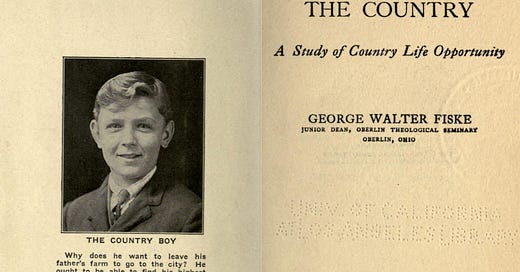Danbom's Resisted Revolution
The Resisted Revolution: Urban America and the Industrialization of Agriculture, 1900-1930
David B. Danbom, 1979
David Danbom (b. 1947) is an Agricultural Historian who spent most of his career at North Dakota State University before retiring in 2010. Although NDSU is only about two hours from where I live we haven’t met. But his first book, published in 1979 (I assume it was based on his 1974 Stanford PhD dissertation) was very useful to me as I was beginning to build a field list in Rural History. In The Resisted Revolution, Danbom portrayed the Country Life Movement as an urban-led crusade to save rural America, but he argued that the leaders were frequently hostile to actual rural people and their interests. Ultimately, the goal of the reformers was to ensure steady supplies of cheap food to support urban growth and low-wage industry, Danbom argued.
Anybody who has been reading my stuff for any time will recognize that Danbom’s argument would appeal to me. And you’d be right. I already leaned in the direction of cynicism toward the urban elites who were behind much of the Progressive program. But when I discovered Danbom early in my own PhD program, several pieces of the puzzle seemed to snap into place.
Another great thing about this book, because it was originally a dissertation, is that Danbom used a wide array of primary sources, many of which are now available online. His narrative tended to see good guys and bad guys, when the reality (even in primary passages he quoted from) was clearly more layered and complex. But then, Richard Hofstadter and others have done the same with the Progressives. It’s a contentious period.
Danbom concluded that, although there was a net loss in farms in the 1920s, medium sized farms fared worst. Tiny and gigantic farms both increased in number. An inference one might draw from this is that the “farmers” Hofstadter railed about may have been different from the rural people Danbom wrote about. Understanding the change in what we define as farmers in this transitional period would explain a lot!
Primary Sources Danbom used:
- Liberty Hyde Bailey, The Country Life Movement in the United States
- Bailey, The Training of Farmers
- Bailey, New York State Rural Problems
- Bailey, The State and the Farmer
- Bryan, Farming as an Occupation
- Blackmar, Social Degeneration in Towns and Rural Districts
- Boyle, Agricultural Economics
- Butterfield, A Campaign for Rural Progress
- Butterfield, The Farmer and the New Day
- Butterfield, Chapters in Rural Progress
- Cance, Immigrant Rural Communities
- Carstens, The Rural Community and Prostitution
- Carver, Principles of Rural Economics
- Carver, Selected Readings in Rural Economics
- REPORT OF THE COMMISSION ON COUNTRY LIFE
- Coulter, Influence of Immigration of Agricultural Development
- The Craftsman, Why Back to the Farm?
- The Craftsman, Getting Back to Our Base of Supplies
- Danielson, The Hill Folk (Hereditary Defectives)
- Devine, Misery and Its Causes
- Dugdale, The Jukes
- Dillingham, Recent Immigrants in Agriculture
- Fiske, Challenge of the Country
- Forbes-Lindsay, The Rural Settlement
- Galpin, Social Anatomy of a Rural Community
- Galpin, Rural Life
- Gathany, What's the Matter with the Eastern Farmer?
- Gillette, Constructive Rural Sociology
- Gillette, Rural Sociology
- Goddard, The Kallikak Family
- Groves, The Rural Mind and Social Welfare
- Hall, Three Acres and Liberty
- Hall, A Little Land and a Living
- Harger, Middle West's Peace Problems
- Harmon, What's the Matter with the Pennsylvania Farmer?
- Harris, Health on the Farm
- James Jerome Hill, Highways of Progress
- Hill, The Natural Wealth of the Land and Its Conservation
- Hill, Addresses by James Jerome Hill
- Holmes, The Passing of the Farmer
- Holmes, Movement from City and Town to Farms
- Jenks, The Immigration Problem, “Recent Immigrants in Agriculture”
- Knapp, Causes of Southern Rural Conditions and the Small Farm as an Important Remedy
- Kolb, Rural Primary Groups
- C.L., Two Views of the Back to the Land Movement
- Lighton, "The Riches of a Rural State"
- McKeever, Farm Boys and Girls
- Mills, What's the Matter with the Farmer?
- Northrup, Rural Improvement (1880)
- Nourse, The War and the Back to the Land Movement
- Phelan, Rural Economics and Rural Sociology
- Ross, Agrarian Changes in the Middle West
- Spillman, Farming as an Occupation for City-Bred Men
- Steiner, Our Recent Immigrants as Farmers
- Strong, The Challenge of the Country
- Twitchell, Outlook for New England Agriculture
- USDA 1940 Yearbook: Farmers in a Changing World
- Vandercook, Rural Delinquency
- Vincent, “Countryside and Nation”
- Waugh, Rural Improvement (audiobook)
- Wilson, “Country Versus City”




